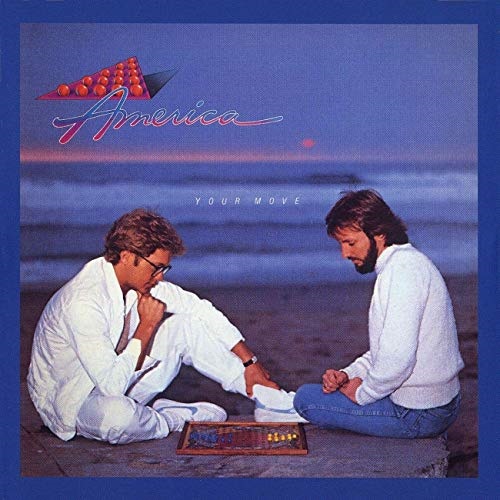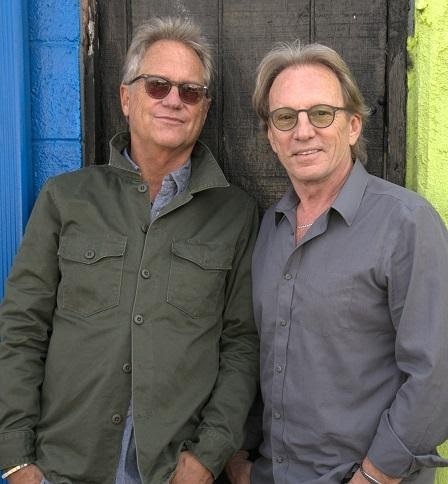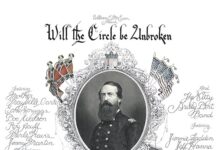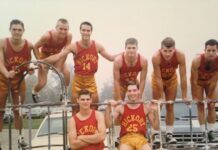America photo courtesy of MSO PR
Gerry Beckley photo courtesy of Joe Beckley
Ten years after taking home the Grammy for Best New Artist, perennial folk-rock group America found itself at a unique compositional and commercial crossroads.
Longtime bandmates Gerry Beckley and Dewey Bunnell were riding high on the airwaves again thanks to their 1982 Number 8 smash “You Can Do Magic.” Penned by noted songsmith (and Argent frontman) Russ Ballard, the song’s success, coupled with the group’s exposure on music television helped drive their accompanying album View from the Ground to one notch shy of the Billboard 200 Top 40.
For a band that scored its biggest successes with self-penned tunes like “A Horse With No Name,” “Sister Golden Hair” and “Tin Man,” having a supposed outsider write a hit for them seems on the surface unorthodox, especially when the group was already 10 albums into its career.
Not so.
“View From The Ground put us a little more back in control. We had always been well aware of the power of a cover song. We had covered “Head and Heart” on Homecoming, our second album, and “Muskrat [Love],” Beckley told me recently. “We knew that we were going to come up with enough of our own material but that it was a nice thing to maybe include one cover on an album. That part of the chemistry was not unique.
“What happened was great all the way around. We were very happy to have that be the representative sound,” Beckley adds, referring to “Magic.” “(Russ) had kind of written it, in a sense, for us and it had a lot of the elements we would use anyway so it didn’t sound like a completely left field choice.”
The timing couldn’t have been better…or more crucial.
Already on its third album for Capitol, the band had been without their third member, Dan Peek, for three years. Two prior albums — 1979’s Silent Letter and 1980’s Alibi – boasted new musical directions and different production help. Yet they failed to keep the group’s hit streak on par with its most successful album output overseen by Beatles mastermind George Martin. View stands out as a unique America album, featuring a bit more of a biting sound on tracks like “Never Be Lonely” and “Even the Score,” and a somber sensibility on tunes like “Inspector Mills.”
“The Capitol years were a little bit of hunt and peck,” Beckley said. “When you’re selling the amount of records we were selling in the Seventies with Warners, there was absolutely no concern with messing with the formula. We were in charge of that; we were writing all of that and it was selling very well for us and for the label. Their intentions were sincere. They believed in the band. They wouldn’t have signed us if they hadn’t. But I think it was exploratory, to put it kindly.”
Beckley adds the success of “Magic” helped solidify America’s reputation as a solid duo, one currently on the verge of celebrating its 50th anniversary.
“We had been gone and off the radio long enough that it was really interpreted as a pretty substantial return. It was also the first time that we could be really viewed as a duo,” Beckley said. “We’d been a duo since ’79 but to have a hit and to be all over the TV and on the air as two guys standing there as opposed to the three was obviously a real help to establishing what became our arch for the next 40 years as a duo.”

With their resurgence in fame, their next album move — the aptly named Your Move (1983) – marked another new direction for America. The bulk of the album would be written by Ballard and feature a sleeker, more polished sound. Recorded at Abbey Road, the album boasts the group’s last Top 40 track — and arguably its best — “The Border.” Featuring Bunnell’s edgiest vocals as well as the distinctive sax work of Raphael Ravenscroft (Gerry Rafferty’s “Baker Street”), “The Border” could arguably be considered America’s darkest song, complete with strings and synth melodies uncommon to the band’s musical makeup.
Fortunately, it contains America’s most noted element – the traditional singsong sing-along members first made famous with “Horse” back in 1972.
“I would put (“The Border”) in the category of kind of ‘Oh, I forgot they did that song,’ because when people come to see a show they obviously might have their top three – the songs that immediately come to mind when they think of us,” Beckley said. “There’s “Horse” and “Sister [Golden Hair]” and maybe “Tin Man” or “Ventura [Highway]” but what is a pleasant reaction that we see in audiences almost nightly is there’s that kind of realization that there’s a dozen other tunes you might have forgotten about … They obviously become the meat of the show in that basically you’re getting 90 minutes of songs you’re pretty familiar with. I think “The Border” is in that category.”
For the record, America has never been afraid to dabble with different musical styles throughout its history. Whether infusing more experimentation into their third album Hat Trick (1973) or assembling their Beach Boys Holland equivalent with 1977’s Harbor, it’s unfair to pigeonhole Beckley, Bunnell (and Peek for that matter) to their subtle “Lonely People” sound.
Yet as well put-together as Your Move sounds, it would be the first America release to be put in motion without direct input from its band members. Still, Beckley and Bunnell’s harmonies are tight on tunes like “She’s A Runaway,” “Honey,” “Don’t Let Me Be Lonely” and “Cast The Spirit.”
“To do an entire album where we weren’t hands-on and playing the music was quite a bit different,” Beckley said. “It was quite unique for Dew and I that the tracks were being cut while we weren’t even there.”
“The Border” also marks one of America’s few music videos of the time period. A somewhat hokey visual showcasing Beckley and Bunnell playing something resembling “War Games,” the members look somewhat out of their comfort zone, having spent their careers dazzling actual audiences as opposed to video cameras.
“Our involvement was basically we didn’t have a choice. It was part of the chemistry of the 80s,” Beckley told me. “For me, I don’t think it had a lot to do with the music.”
America’s Capitol period would sustain through one more studio album, Perspective (1984), and another live release, In Concert. Even with changing styles and waning popularity through the era of excess, the group has persevered. Never expecting to win the Best New Artist Grammy, the band watched in surprise as they not only beat out Loggins and Messina, the Eagles, Harry Chapin and John Prine, but witnessed British chanteuse Dusty Springfield accept the award on their behalf.
“She said, Well, I’m sure the lads are very happy,’ which we were,” Beckley told me.
“We obviously started in a very kind of gifted position. When your first album and single are basically Number One records around the world, there’s one way to wrap that: there’s only one direction you can go from here — the wrong way,” he adds. “This is why things like Best New Artist are misconstrued. Very often, it’s an exact parallel to one-hit wonders … That’s a hurdle fortunately we cleared very early with our second album, which sold more than our first and we had follow up hits immediately.”
Beckley has just released a new solo album, Five Mile Road on Blue Elan. The work finds the breezy troubadour penning and singing songs reflecting his collective past as well as his optimistic future. Tracks like “Calling,” “Vagabond” and “Two People at Once” give the always sweet-sounding musician a more rootsy quality, one that elevates him to the realm of introspective contemporaries like Bruce Hornsby in his Noisemakers period.
“To me, it’s still a really great experience to make an album. I love to do it,” he said. “I’m never short of material. I always have a nice big pile of stuff to dig into and I think this one came out really good.”
As for America, the group’s plate remains full — with album reissues, interview recordings and 100 live shows a year to boot. All with no end in sight. Listening to View and Move can help mark the occasion properly.
“It’s a good time to be in the band,” Beckley said. “We’re very proud of what we’re celebrating.”
Let’s just hope that one day the Rock and Roll Hall of Fame lets their consideration horses run free come induction ballot time.

***
Share your feedback and suggestions for future columns with Ira at vinylconfessions84@gmail.com.




















